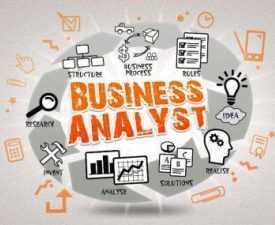Description
Course Name: Certificate in Management (Business Analytics)
Course Id: CIMBAQ1001.
Eligibility: Graduate or Equivalent.
Objective: The Certificate in Management (Business Analytics) is a specialized short-term program aimed at equipping individuals with the skills and knowledge required to analyze business data and support decision-making processes. This program combines management principles with analytical tools and techniques, preparing learners for roles in data-driven industries.
Duration: Two Month.






Debit/Credit Card, Wallet, Paytm, Net Banking, UPI, or Google Pay.



• A soft copy (scanned) of your certificate via email within 7 days of examination.
• A hard copy (original with official seal and signature) sent to your address within 45 day of declaration of result.

Online Examination Detail:
Duration- 60 minutes.
No. of Questions- 30. (Multiple Choice Questions).
Maximum Marks- 100, Passing Marks- 40%.
There is no negative marking in this module.
| Marking System: | ||||||
| S.No. | No. of Questions | Marks Each Question | Total Marks | |||
| 1 | 10 | 5 | 50 | |||
| 2 | 5 | 4 | 20 | |||
| 3 | 5 | 3 | 15 | |||
| 4 | 5 | 2 | 10 | |||
| 5 | 5 | 1 | 5 | |||
| 30 | 100 | |||||
| How Students will be Graded: | ||||||
| S.No. | Marks | Grade | ||||
| 1 | 91-100 | O (Outstanding) | ||||
| 2 | 81-90 | A+ (Excellent) | ||||
| 3 | 71-80 | A (Very Good) | ||||
| 4 | 61-70 | B (Good) | ||||
| 5 | 51-60 | C (Average) | ||||
| 6 | 40-50 | P (Pass) | ||||
| 7 | 0-40 | F (Fail) | ||||







Syllabus:
Introduction to Business Analytics: Definition and scope of business analytics, Importance of analytics in decision making, Types of business analytics (descriptive, predictive, prescriptive), Business intelligence vs business analytics, Data-driven decision-making process, Role of big data in analytics, Key components of business analytics systems, Overview of business analytics tools and software, Business analytics in different industries, Case studies on the application of business analytics.
Data Collection and Management: Sources of business data (internal and external), Types of data: structured and unstructured, Data collection techniques and methods, Data cleaning and preprocessing, Data storage and retrieval systems, Data quality management, Data integration from various sources, Introduction to data warehousing, Data governance and security, Case studies on data management in business analytics.
Statistical Methods for Business Analytics: Basic statistical concepts for business analytics, Descriptive statistics: mean, median, mode, Variability and spread: range, variance, standard deviation, Probability distributions in analytics, Inferential statistics: hypothesis testing, Regression analysis and correlation, Time series analysis for business forecasting, Statistical tools and software for analysis, Case studies on applying statistics in business problems.
Predictive Analytics and Modeling: Introduction to predictive analytics, Techniques in predictive modeling (linear and logistic regression), Data mining and machine learning in business analytics, Model building and validation, Overfitting and underfitting in models, Cross-validation and performance metrics, Predictive analytics tools and software, Application of predictive analytics in business decision-making, Introduction to artificial intelligence in analytics, Case studies on predictive analytics in various industries
Data Visualization and Reporting: Importance of data visualization in business analytics, Principles of effective data visualization, Types of data visualization (charts, graphs, heat maps), Tools for data visualization (Tableau, Power BI, etc.), Creating interactive dashboards, Key performance indicators (KPIs) and metrics, Reporting business insights through visual representation, Storytelling with data, Communicating complex data effectively, Case studies on successful data visualization strategies.
Prescriptive Analytics and Optimization: Introduction to prescriptive analytics, Optimization techniques in business analytics, Linear programming and its applications, Decision analysis and making under uncertainty, Simulation modeling and Monte Carlo methods, Resource allocation and capacity planning, Cost-benefit analysis in decision-making, Application of prescriptive analytics in supply chain and operations, Use of prescriptive analytics in marketing and finance, Case studies on prescriptive analytics in business optimization.
📊📈 Career Scope After Certificate in Management (Business Analytics) – India
The Certificate in Business Analytics Management equips students with the ability to analyze business data, derive insights, and support decision-making processes. It covers tools like Excel, SQL, Power BI, Tableau, and basics of statistics, predictive analytics, and data visualization. It’s designed for freshers or working professionals aiming to work in data-driven roles across sectors.
✅ 1. Top Career Opportunities & Job Roles
| Job Role | Key Responsibilities |
|---|---|
| 📉 Business Analyst (Entry-Level) | Interpret business data, identify trends, create reports. |
| 🧮 Data Analyst (Junior) | Clean and analyze datasets, visualize key metrics. |
| 📈 MIS Executive / Reporting Analyst | Generate weekly/monthly dashboards using Excel/BI tools. |
| 🧾 Operations Analyst | Optimize processes using performance data. |
| 🧠 Market Research Analyst | Analyze customer, sales, or competitor data. |
| 💻 SQL/Excel Analyst | Query databases and prepare performance summaries. |
| 📊 Sales/Marketing Analyst | Support campaigns with ROI and conversion data. |
| 🧑💼 Client Insights / Customer Analytics Executive | Understand consumer behavior from CRM data. |
🏢 2. Industries Hiring Business Analytics Graduates
-
💼 IT & Consulting Firms (TCS, Infosys, Accenture, Wipro)
-
📦 E-commerce (Amazon, Flipkart, Meesho)
-
🏦 Banking & Financial Services (HDFC, ICICI, Axis Bank)
-
🛒 FMCG & Retail (HUL, Nestle, Reliance Retail)
-
📈 Marketing & Digital Agencies
-
🏥 Healthcare & Pharma Companies (Cipla, Apollo)
-
🏢 Startups & Data-Driven SMEs
-
📚 EdTech, FinTech & HealthTech sectors
-
🏛️ Government & NGOs (for impact measurement)
💰 3. Salary Range in India (2025 Estimates)
| Job Role | Monthly Salary (INR) |
|---|---|
| Business Analyst (Fresher) | ₹25,000 – ₹45,000 |
| Data Analyst (Entry-Level) | ₹28,000 – ₹50,000 |
| MIS Executive | ₹18,000 – ₹35,000 |
| Reporting Analyst | ₹25,000 – ₹40,000 |
| Market Research Analyst | ₹20,000 – ₹38,000 |
| SQL/Excel Data Operator | ₹20,000 – ₹32,000 |

